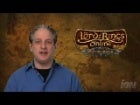It hasn't been an easy journey for The Lord of the Rings Online. What first began in 2003 as Middle-earth Online has been plagued by name changes, publisher changes and a huge retrenchment in which the developers essentially went back to the drawing board and rebuilt the product from scratch. Unlike the fantasy stories the game is based on, this is usually a recipe for disaster in the real world, but like the hairy-footed heroes of Tolkien's novels, the development team at Turbine soldiered on and emerged triumphant, creating an exceptional MMO that can easily stand among the best in the genre.
The basic gameplay of The Lord of the Rings Online will be immediately familiar to anyone who's played the original EverQuest, World of Warcraft or, really, just about any MMO released in the last five years. The four racial choices each offer an array of benefits and drawbacks and there are a number of classes that fall more-or-less into basic MMO roles such as tank, healer, crowd control, and ranged and melee DPS. Combat is a familiar series of turn-based rounds punctuated by the player triggering a variety of special attacks and watching the cooldown meter on the interface.
The world is filled with quests to complete, instances to experience, items to craft, PvP that (while segregated from the main game) makes for a nice diversion, and an end-game consisting of several high-end raid zones in Northern Angmar. There's almost no learning curve for anyone even slightly familiar with how an MMO works, and the game's first five or six character levels are structured as a fun tutorial for MMO newbies. Far from being a weakness, the lack of innovation in basic gameplay structures actually turns out to be a strength. It may indeed be WoW-with-Hobbits, but there's something to be said for not fixing what isn't broken.
Dirty Deeds Done Dirt Cheap
The real genius of The Lord of the Rings Online lies in the way it mixes up familiar MMO structures to offer a constant stream of player accomplishments -- the "ding" moments -- beyond the obvious ones of increasing character level and acquiring new gear. The heart of this dynamic (and the game's best innovation) is the "deed log." This is an achievement-like system of rewards given out for accomplishing things. There are deeds for almost every type of activity in the game. Kill four or five brigands in Ered Luin, for example, and the player gets a message that they've uncovered the "Brigand-slayer" deed. Killing 30 more brigands entitles the player to have "Defender of the Halls" underneath his or her name. Kill 60 more and the player gets the "Justice" trait -- one of a series of permanent buffs that can be loaded on a player by bards in towns. There are exploration deeds accomplished by visiting Elf ruins or scouting out the enemy, class deeds won by just using class skills over and over, racial deeds ferreted out by discovering hidden conditions, and even legendary deeds acquired by fighting the most powerful enemies in the game.
As a practical matter, the deed log operates as a highly customizable talent system. Since traits can be swapped in and out, acquiring the right ones can drastically impact the way a class is played. The right traits can help a Lore-master to become a ranged DPS class or build up their animal companions to bolster their crowd-control capabilities. A Captain can be an effective off-tank with the right system of traits or can just hang back and act as a buffer in an instance, setting up "Fellowship Conjunctions" that offer boosts to damage output or replenish health or mana bars. This customizability also helps in party formation since as players enter higher-level areas, there are situations in which every class gets the opportunity to shine and there really isn't any situation in which a particular class is "useless."





 Outstanding!
Outstanding!


